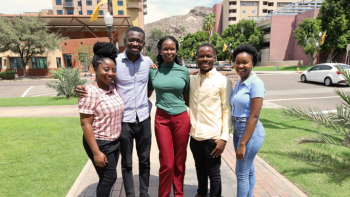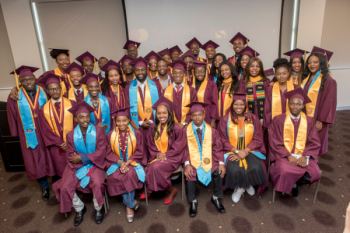For prospective graduate students from Sub-Saharan Africa, studying in a world-class university is no longer a wish, but an achievable dream.
The Baobab platform, a Mastercard Foundation initiative in partnership with Arizona State University, offers the Baobab Digital Innovation Scholars Program for young African students to pursue various ASU graduate degree programs related to the educational technology field, including user experience, information technology, learning sciences and software engineering.  From left: 2021 Baobab Scholars Jennifer Sarfo, Kwabena Adu-Darkwa, Sandra Nabulega, Hero-Godsway Zilevu and Viola Melly. Download Full Image
From left: 2021 Baobab Scholars Jennifer Sarfo, Kwabena Adu-Darkwa, Sandra Nabulega, Hero-Godsway Zilevu and Viola Melly. Download Full Image
The program was conceptualized to build education technology capacity for the African continent and prepare a cadre of young African scholars for employment and entrepreneurial ventures in the field.
Founded in 2021, the Baobab Digital Innovation Scholars Program will provide 25 young African scholars with graduate-level education and professional training in fields critical to the educational technology and online learning space over the next four years.
Baobab currently has five graduate students studying at ASU in its first cohort. The second cohort comprises 10 students who have been offered scholarships for various master’s degree programs. This cohort started classes in August, and will be followed by a third and final cohort of 10 students, who will join the program in 2023.
Jennifer Sarfo, from Ghana, is currently pursuing a master’s degree in software engineering through the program and describes herself as a future software developer. Sarfo, whose sister is an alumni of the Mastercard Foundation Scholars Program, said the software engineering training she is acquiring through her program at ASU will enable her to contribute to solving critical global problems that require software solutions.
“I have always believed that mobile and web applications will never go extinct in our world. With people increasingly depending on phones and social media becoming integral parts of people’s lives, mobile and web applications are here to stay,” said Sarfo, who obtained her undergraduate degree from Ashesi University in Ghana before accepting the Baobab scholarship.
“I think Africans are looking for learning opportunities in prestigious world institutions that do not cost as much as they do when attending physically. Online education will help address most if not all of these concerns and give Africans access to higher education that will help them acquire relevant skills.”
Sarfo is currently working on the Salesforce team at EdPlus, building custom mobile and web applications using the Salesforce framework.
Sandra Nabulega, a Makerere University-trained statistician, is one of the students who joined the first cohort of the Baobab program from Uganda. Nabulega was an alum of the Mastercard Foundation Scholars Program before she moved to ASU to pursue a master’s degree in learning sciences. Nabulega said a university like ASU, with a variety of learning resources, is a place she always dreamed of studying in.
“Studying about learning and how different people learn is not anything anybody has ever thought of studying in our local universities on the continent. Since I took these courses at ASU, I have realized a great difference as somebody who used to train people. I’m not only learning in a classroom but also taking online learning. I am eager to know more about how different building applications with Salesforce are from other languages like Java, Angular and others, and I can’t wait to develop applications for the team,” she said.
Nabulega described online education as the future of learning in Africa. Given the situation of what happened to in-person classroom learning during the last two years of the COVID-19 pandemic, she described a need to shift to online education that has become a matter of priority.
Kwabena Adu-Darkwa, a Ghanian studying information technology, said he sees a bright future for IT on the continent of Africa given the exponential growth realized in the past decade. He works on the Salesforce team at EdPlus and had also worked in the tech industry in Africa for two years before coming to ASU.
Adu-Darkwa said one of his goals is to leverage skills from the program that will enable him to create innovative educational technology solutions that will fit the context of the African continent.
“With the rising interest in ed tech, I believe that in the next few years we will see many initiatives innovating in this space for the African market. These solutions will become more accessible to the masses and will scale across the continent. I am working on advanced information management systems. My primary goal is to connect what I’m learning, which focuses on big data. This is what I would like to pursue once I return to Africa,” he said.
The Baobab Digital Innovation Scholars Program is part of Baobab’s Phase 2, a second five-year grant with the Mastercard Foundation with a focus on training an educational technology talent pipeline of Mastercard Foundation Alumni and Scholars across the continent of Africa.
Written by Atok Dan, Hubert H. Humphrey Fulbright Fellow at the Walter Cronkite School of Journalism and Mass Communication.
During the initial phases of the Mastercard Foundation Scholars Program, Arizona State University President Michael Crow had a conversation with Mastercard Foundation President and CEO Reeta Roy as they thought through the future of the scholars program and its desired impact.He asked her some key questions about the alumni strategy for the program:What should a sustainable alumni strategy for int…
During the initial phases of the Mastercard Foundation Scholars Program, Arizona State University President Michael Crow had a conversation with Mastercard Foundation President and CEO Reeta Roy as they thought through the future of the scholars program and its desired impact.
He asked her some key questions about the alumni strategy for the program:  May 2019 ASU Mastercard Foundation Scholar graduates. Photo courtesy ASU Download Full Image
May 2019 ASU Mastercard Foundation Scholar graduates. Photo courtesy ASU Download Full Image
- What should a sustainable alumni strategy for international scholarship recipients look like?
- How would they ensure graduates would continue to engage with the community after completing their studies?
- How would scholars who had studied outside of Africa for the past four years build their professional networks and find opportunities on the continent?
- How do we ensure alumni have access to lifelong learning and upskilling opportunities after graduation?
With these questions in mind, beginning in 2014, ASU was awarded a management grant to research the viability of an online platform that would not only connect African youth wherever they’re located around the world, but also allow for ongoing learning throughout their alumni journey. Using a human-centered design approach, the team engaged with African youth to understand their needs before going into design.
In 2016, the Baobab digital platform was launched as a way for scholars and alumni of Mastercard Foundation scholarships to network, connect and collaborate with one another. It has since expanded to welcome all African youth who are changemakers in their communities and, more importantly, share the same goal of making an impact in Africa.
With the sixth anniversary of Baobab’s launch coming in October and the 10th anniversary of the Mastercard Foundation Scholars Program, we talked with Bethany Weigele, chief innovation officer at ASU’s EdPlus, about Baobab’s first six years and the future of the empowering program.
Question: What is ASU’s role in the Baobab program?
Answer: ASU is the program’s strategic implementation partner. We deliver on the Mastercard Foundation’s vision of providing access to resources that will enhance, facilitate and support the transition experiences for African youth and allow them to attain their personal and professional goals and connect to dignified employment.
The digital platform was initially designed for Mastercard Foundation Scholars with varying levels of internet access. These scholars were located at over 32 partner institutions/universities, 95% of which were in Africa, and the remaining 5% located across the United States, Canada, France, Lebanon and Costa Rica. The idea was to create a scalable alumni strategy leveraging technology and utilizing custom code for low-bandwidth environments. And today, that number of partner institutions continues to grow as we engage in new partnerships. In addition to the scholars program, Baobab is also serving other Mastercard Foundation portfolio programs, including YALI, Youth Think Tank, Ashoka, Zambezi and more.
Q: What kind of growth has the Baobab platform seen since its inception?
A: Baobab was initially conceptualized and designed as a platform exclusively for students and alumni of the Mastercard Foundation Scholars Program who registered for it through an invitation sent by their affiliated university. Four years after its initial release, we were excited to expand the program and welcome all African youth committed to positive change in Africa.
Baobab has grown exponentially in the past two years and now includes more than 19,000 members. The members of Baobab are a network of young leaders with diverse training backgrounds, skill sets and educational levels. Baobab’s top user countries include Ghana, Kenya, Uganda and Rwanda, followed by Nigeria, Benin, Cameroon and Ethiopia, which are countries at the heart of the foundation’s initiatives.
Some other program growth highlights include:
- Our mentorship program began with one-to-many mentorship crowd-sourced opportunities via “Ask Me Anything” sessions, Zoom webinars and other live events providing a variety of group-level mentorship opportunities. With an emphasis on human-centered design and continued learning around our users’ needs for mentorship, we’ve expanded our programming to include one-on-one mentorship at scale, providing individualized personalized mentorship opportunities with Africa-based mentors with relevant expertise and networks for 2,500 unique individuals in collaboration with Global Give Back Circle.
- Our team has developed more than 50 courses for program participants. We leverage expert ASU faculty where applicable, as well as work with African subject matter experts and talent from partner institutions to help provide the right contextualization. We provide soft and hard skill development courses ranging from critical thinking, to public speaking project management, business analytics, Python and Excel. All courses are available in English and French.
- In the spirit of Young Africa Works, Baobab has provided 107 paid opportunities to date for African youth, Mastercard Foundation Scholars and alumni to support the growth of Baobab in the form of content development, multimedia and marketing, technical support and research.
Q: What are you most excited about with the future of the program?
A: There’s a lot to be excited about with the future of Baobab! This year, we’ll be releasing a massive update to the platform’s code and design to increase speed and performance for our users on the continent. ASU has modified and contextualized the me3 career exploration game, providing a multimillion dollar tool to serve the Baobab community and larger African audience. me3 for Africa is scheduled to launch early this fall.
We continue supporting African youth with transitions to employment, particularly for special groups including women, individuals with disabilities and refugees/displaced youth in alignment with Mastercard Foundation’s Young Africa Works strategy. More importantly, we continue to be guided by the needs expressed by African youth and leveraging ASU’s expertise and assets to deliver a youth-informed platform.
Story written by Chad Hays, marketing content specialist, EdPlus at ASU
Contact us

